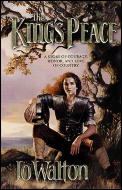
| Series: | Tir Tanagiri #1 |
| Publisher: | Tor |
| Copyright: | October 2000 |
| Printing: | August 2002 |
| ISBN: | 0-765-34327-4 |
| Format: | Mass market |
| Pages: | 530 |
Given that it's set in post-Roman Britain after the withdrawal of the Roman legions, following the Britons in their efforts to hold back Saxon raiders and unify the land under a single king, one might expect The King's Peace to be an Arthurian. And it is, of sorts; many of the characters are here, some of the plot threads remain the same, and this book clearly does deal with the Matter of Britain.
That being said, The King's Peace is primarily a medieval war novel rather than a traditional Arthurian. The names are changed, some parts of the legend are changed (personally, I'm very grateful for the absence of the traditional love triangle), and this world isn't quite the Britain that we know. For one, magic works, if only at a small and subtle level, allowing easier healing and other personal and household charms. For another, the gods are very much present and felt by the rulers of the land, and at times take an active role in the affairs of men and women.
I'm not generally much of a fan of Arthurians, but that's mostly because of the ever-annoying love triangle and the ahistorical trappings of chivalry. Walton gets down to the parts that I do find interesting, namely the feel of the times following the collapse of Roman influence, the struggle to define a nation, and the questions of how people view and support their rulers and kings. The King's Peace compares quite favorably to Jack Whyte's books, which attempted something similar but with larger scope and fell into traps of making the heroes too influential and the plot not compelling or believable enough.
That being said, this book is also a little odd in several ways. For one, this is the first half of a duology which clearly isn't actually a duology. It's either a single huge book or a trilogy, and I think it probably works best as a single book given the unfinished business between books, but the story very clearly comes in three parts, two of which are packaged together in The King's Peace for no particularly good reason. You will want to have The King's Name on hand to pick up after you finish this one, since the story doesn't reach a satisfying conclusion.
Befitting the first-person perspective and the viewpoint character of an educated but hard-bitten female soldier in the army of the High King, the writing style is abrupt and choppy, full of noticeably short sentences. While this feels right for the character, it did make the book feel slightly difficult to read for me, breaking my normal reading flow a little. The pacing also leaves a bit to be desired, occasionally descending into news of politics and families or news of troop movements and maneuvers that left me lost in the barrage of barely-remembered names and unfamiliar places. I'm afraid my eyes glazed over on several occasions while the characters exchanged news and speculation about the cast of thousands of supporting characters. This may partly be because I wasn't interested in searching for the parallels with characters from the traditional Arthurian legend, but I think much of it is inherent in the writing.
There are strong sections of narrative, though, and the battles and significant events turned into engaging page-turners. I just wish that somehow the journeys between the high points could have been shortened or made easier for the reader. The characters feel real and nuanced, avoiding both too-good heroes and too-simple villains. Likeable people do evil things, unreliable people have moments of brilliance, and the characters are well aware of the shades of grey and the complex balancing of politics, family, patriotism, compromise, pragmatism, and religion that shape their world.
I was also very impressed with the gentle shading of magic given the world. There are no great wizards shaping the battlefield or land, only what in another fantasy would be called hedge wizardry, and yet the practical implications of small spells are thoroughly and deftly explored. One forgets occasionally that there is magic until a character expresses surprise that someone doesn't simply reattach their severed arm, or hunts the battlefield for the discarded weapon that caused a wound so that it can be healed. Magic is woven so well into the day-to-day actions of the characters that one can truly believe it's something they've lived with always.
I'm still pondering the effects on a medieval society of making pregnancy sufficiently linked to natural magic that women simply don't become pregnant unless they deeply want to, have otherwise had fertility charms performed, or have the particular attention of a god. At first, I was wondering if Walton still had too many bastards and illegitimate heirs in the story, but after further consideration, I think she got it about right.
This is a very well-thought-out book. I won't recommend it fully because of the pacing issues and somewhat difficult writing, but if you like medieval war novels, this is one that shows its research well while still adding enough of a twist to be satisfying as fantasy. I liked Sulien as a main character a great deal, and I loved how The King's Peace avoids easy answers and black and white morality. (If you already aren't particularly fond of Christianity, this book will definitely not help. The arrogant superiority and close-minded attitude of some of the monks of the Christianity equivalent is highly infuriating, although even this has its own shades of nuance and individual difference.)
For a first novel, this is quite good. I'm curious where Walton will take the final chapter of the story.
Followed by The King's Name.
Reviewed: 2004-11-17